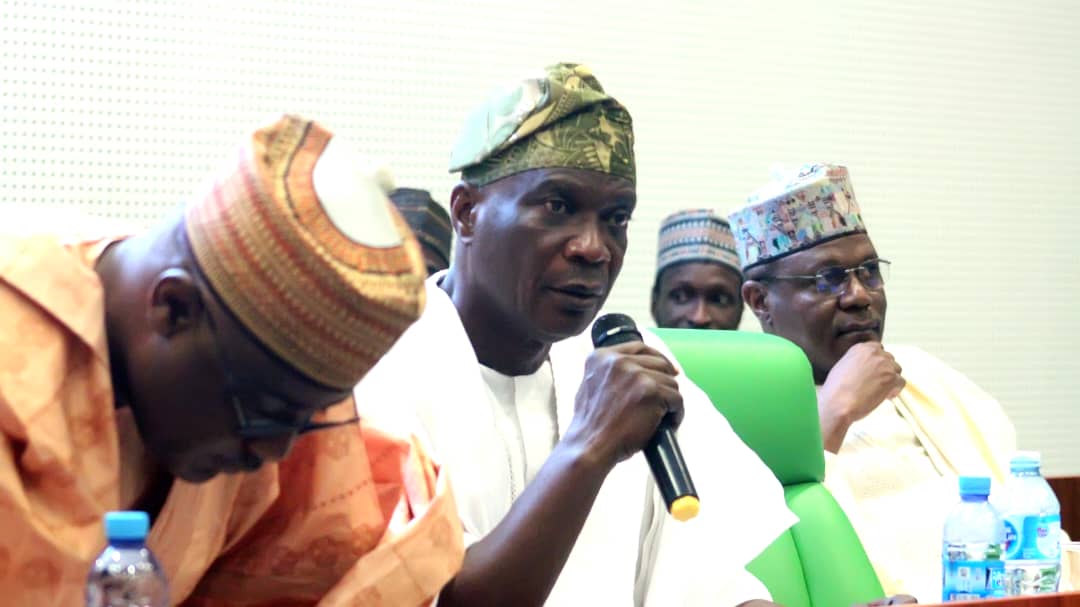Agriculture
Africa Not Among 10 World Largest Area Of Organic Land

The Country Coordinator of Ecological Organic Agriculture (EOA) Initiative in Nigeria Dr. Olugbenga AdeOluwa, has hinted that no country in Africa is among the ten world largest area of organic land.
Dr. AdeOluwa said this during his online presentation on the Principles of Organic Agriculture practices organized by Journalists Go Organic Movement.
Journalists Go Organic is a Pan African initiative that brings journalists together with organic agriculture and environment experts on how to have a healthy nation and a healthy environment.
He said that low level of technical know-how among stakeholders and policy makers have been part of the major limitations to the development of the organic agriculture sector in Africa.
“Global organic sector was valued at 130 billion US dollars as at 2019, with 72.3 million hectares managed by over 3.1 million producers and yet Africa is still found wanting”.
AdeOluwa, an Associate Professor in the Department of Soil Resources Management, University of Ibadan said organic agriculture contributes a lot to the health of the world.
“The Principles of Health, Ecology, Fairness, and Care are the roots from which organic agriculture grows and develops.
“Ensuring healthy living of both the living and non-living components of the ecosystem is a MUST in organic agriculture.
“This is what you don’t get from conventional agriculture, where ‘you rob Peter to pay Paul’ like the indiscriminate use of harmful agrochemicals without concern for its negative impact on the health of those in the value chain’’.
According to him, `organic agriculture is a holistic production management system which enhances agro-ecosystem health, utilizing both traditional and scientific knowledge.
“It contributes to agro-ecosystem balance or sustenance; protecting native entities, including biodiversity, biological cycles, and soil biological activity.
It emphasizes the use of management practices in preference to the use of off-farm inputs, taking into account the fact that regional conditions require locally adapted systems.
“This is accomplished by using, where possible, agronomic, biological, and mechanical methods, as opposed to using synthetic materials, to fulfill any specific function within the system’’.
He added that organic production method thus plays a dual societal role: on one hand it provides for a specific market responding to a consumer demand for organic products, and on the other hand delivers public goods contributing to the protection of the environment and animal welfare, as well as to rural development.
He, however, said that journalists need a proper understanding of organic agriculture principles in order to properly address issues in the sector.
“Truly, journalists have great roles to play in taking Nigeria to a higher level and in exploring the several opportunities for mankind within the organic agriculture system.
“A major question is how far can journalists go in proper advocacy for organic agriculture when they don’t have good understanding of the sector?
“So, it is vital that journalists, as the society’s watch dogs and indeed all stakeholders, should be trained and retrained in organic agriculture practices for the health of the world and its inhabitats.
This is one of the reasons for increasing development of organic agriculture all over the world; increasing consumer awareness of the benefits of organic agriculture.
Health considerations, especially, is increasing the demand for organic produce and products.
on her own, the Founder, ‘Journalists Go Organic’ a Pan African Initiative a Journalist per excellent Mrs Ebere Agozie, with the News Agency of Nigeria (NAN) said the project was born out of the desire to help curb strange sicknesses ravaging the world today.
This project is to build the capacity of journalists across the African continent not only in the promotion of, and sustenance of, organic agriculture, but in getting them to become organic farmers.
The unique innovation is to work with journalists who are the watch dogs of the society to take the words and benefits of organic agriculture to every nook and cranny of the country.
Since we are what we eat, we can no longer leave the business of our health and that of our environment to farmers alone.
Nigeria must be number one in the drive for organic agriculture in Africa and among the best ten in the world; therefore, we must sit up and work as a team”.
Agriculture
House Moves to Overhaul Livestock Sector, Investigate ₦498.7m Unpaid Poultry Farmers’ Compensation — Wale Raji

By Cyril Ogar
The House of Representatives Committee on Livestock Development has announced plans to overhaul Nigeria’s livestock sector and investigate the Federal Government’s failure to pay ₦498.7 million in compensation to 307 verified poultry farmers affected by bird flu outbreaks between 2021 and 2023..
Chairman of the Committee, Hon. Wale Raji, disclosed this on Thursday during a public hearing on six livestock-related bills held at the National Assembly Complex, Abuja. The proposed bills seek to establish livestock colleges and research institutes across the country to promote animal production, veterinary education, and professional training.
Raji explained that the public hearing was convened to enable stakeholders to contribute ideas aimed at strengthening livestock development and resolving the challenges faced by farmers, particularly those impacted by avian influenza.
“This engagement provides stakeholders a platform to make meaningful input that will enhance productivity, create jobs, and promote sustainable livestock growth,” Raji stated.“However, we are deeply concerned about the delay in compensating affected poultry farmers, and we are determined to ensure transparency and accountability in the entire process.”
₦498.7 Million Still Outstanding
Representing the Permanent Secretary of the Federal Ministry of Livestock Development, Dr. Chinyere Akujobi, the Director of Veterinary Services, Dr. Adeniyi Adedoyin, confirmed that ₦498.7 million remains unpaid to 307 poultry farmers whose flocks were destroyed during bird flu outbreaks between 2021 and 2023.
According to him, ₦3.16 billion had earlier been disbursed to 1,055 farmers affected by previous outbreaks, but the latest phase of payments was stalled due to funding shortfalls. He added that a recent outbreak in Wukari, Taraba State, led to the culling of over 2,000 birds, with compensation yet to be processed.
Adedoyin attributed the delay to inadequate budgetary provisions and the absence of an Animal Diseases Contingency or Emergency Fund (ADEF), explaining that no dedicated fund for animal disease response has existed since 2021.
“Most affected farmers also lack insurance coverage as required by law, further complicating the compensation process,” he said.
He noted that in 2022, the Federal Executive Council (FEC) approved a revised compensation formula—50% from the Federal Government, 25% from the state, and 25% from farmers—restricting eligibility to smallholders with flocks under 3,000 birds.
Lawmakers Push Livestock Reform Agenda
Hon. Raji emphasized that the committee’s probe and reform efforts are in line with the National Livestock Transformation Plan (NLTP), which seeks to modernize animal husbandry, enhance veterinary services, and improve productivity across the value chain.
“Our goal is to build a vibrant and sustainable livestock sector that contributes meaningfully to food security, employment generation, and economic diversification,” he said.“We will also work to ensure that farmers receive their compensation and that government creates an emergency response fund to prevent future delays.”
He assured that the committee will pursue full implementation of the hearing’s recommendations to strengthen policy, research, and training in the livestock industry.
Push for New Livestock Institutions
Among the bills under consideration is one sponsored by Hon. Bello Ka’oje (Kebbi State) seeking to establish the Federal College of Animal Husbandry, Ka’oje. The proposed college will serve as a centre for research, training, and innovation in livestock production.
Ka’oje said the institution would improve animal breeding, promote best practices in livestock care, and drive productivity and employment.
“This initiative aims to advance livestock development through professional training and innovation,” he stated.“It will help strengthen food security, create jobs, and raise the standard of animal production in Nigeria.”
He noted that Nigeria continues to trail behind countries such as Egypt, Kenya, and Ethiopia, ranking 94th in global milk production and 33rd in meat production as of 2022, despite its vast agricultural resources.
Commitment to Accountability and Growth
Hon. Wale Raji reaffirmed the House’s commitment to transparency and effective oversight in livestock management.
“We will ensure that every stakeholder in the livestock value chain benefits from government policies and programmes,” he said.“Our ultimate goal is to reposition the livestock industry as a key driver of national growth, rural development, and economic stability.”
-

 Featured6 years ago
Featured6 years agoLampard Names New Chelsea Manager
-

 Featured6 years ago
Featured6 years agoFG To Extends Lockdown In FCT, Lagos Ogun states For 7days
-

 Featured6 years ago
Featured6 years agoChildren Custody: Court Adjourns Mike Ezuruonye, Wife’s Case To April 7
-

 Featured6 years ago
Featured6 years agoNYSC Dismisses Report Of DG’s Plan To Islamize Benue Orientation Camp
-

 Featured4 years ago
Featured4 years agoTransfer Saga: How Mikel Obi Refused to compensate me After I Linked Him Worth $4m Deal In Kuwait SC – Okafor
-
Sports3 years ago
TINUBU LAMBAST DELE MOMODU
-

 News11 months ago
News11 months agoZulu to Super Eagles B team, President Tinubu is happy with you
-
Featured6 years ago
Board urges FG to establish one-stop rehabilitation centres in 6 geopolitical zones
